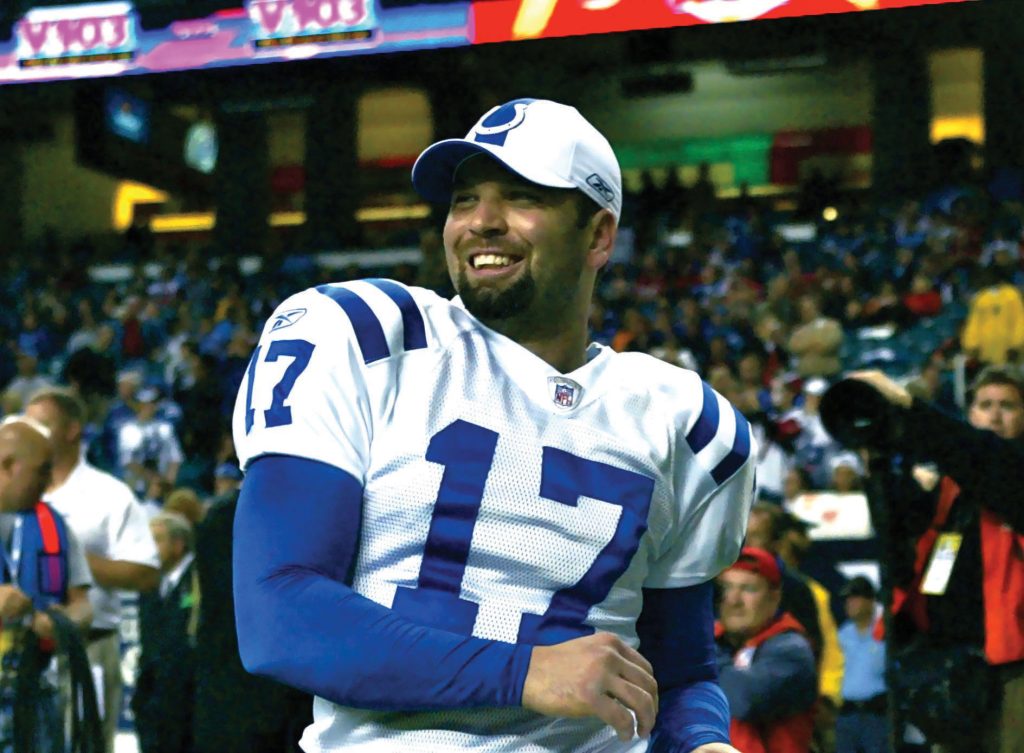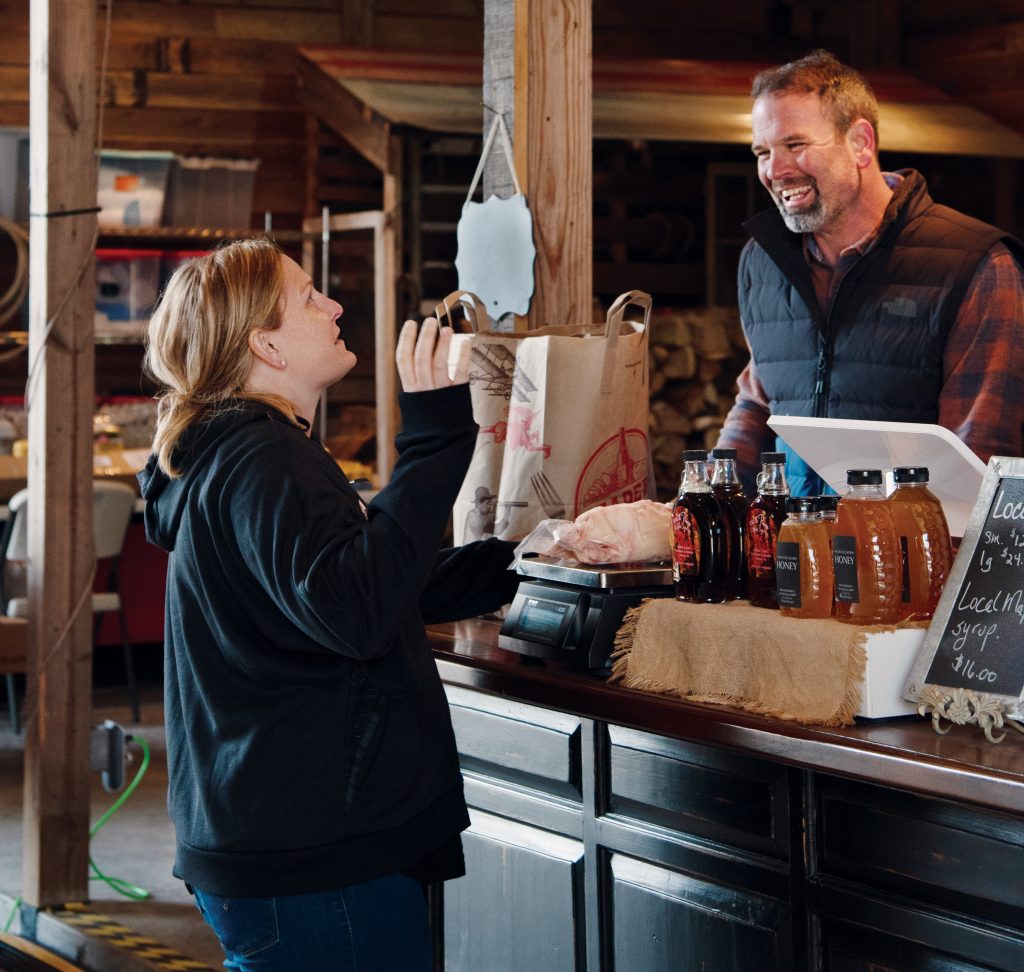
By Richard G. Biever
A wintry wind blustered around the big red-sided barn at WonderTree Farm, just north of Zionsville. Inside, Hunter Smith pulled another wedge from a neatly stacked cord of firewood and deposited it into a pot-bellied stove.
The 105-year-old restored relic is the newest addition to the farm’s store. Set in a corner off the barn’s central aisle, the wood burner creates what Smith noted is “the coziest nook on the farm.”
Customers, friends and suppliers — many who are one and the same — concur as they huddle in blankets with a kitten or three during the farm store’s winter
business hours.
“We have a little club,” said Shannon Smit, one of the regulars, one Tuesday in January. “Hunter had to install this so we’d have somewhere to keep warm and chat, right?” she added, nodding toward Smith.
“We talk football. We talk music. We talk a lot about food and homesteading and farming. We talk about all kinds of things,” Smith said, “and all the topics you’re not supposed to talk about. We talk about faith, religion, politics.”
The scene evoked the wistful charm of an old country store that artist Norman Rockwell could have painted. Both the old and the new of it invoked the spirit of what WonderTree is all about.
WonderTree is a “regenerative farm” that harks back to an agriculture of the past. Regenerative farming emphasizes community and locally produced food, as well as sustainable farming methods that improve the health of people, the land and the animals that provide the food. In a personal way, the farm takes Smith, the 45-year-old former punter for the Indianapolis Colts, full circle, returning him to his family roots.
“People think that there is such a benefit to the way agriculture has adapted and developed into a large mechanistic system,” Smith said. “What we have lost by doing that is the human element, both the human impact on agriculture and the impact of agriculture on humans.”
Smith, who earned degrees in theology and sociology at the University of Notre Dame while punting for the Fighting Irish, said regenerative farming is just the traditional model that people have used since time immemorial. As Smith put it, it’s “giving back to the land that gives to us.”
“For 10,000 years we have produced our own food. That is just a part of the human experience that we’re moving back toward because it’s part of our nature.”
For Smith and his dedicated patrons who drive through the open barn to shop for cuts of grass-fed beef, pastured pork, chicken, turkey, eggs and gallon jugs of raw milk, this farming is not of the past. This farming is of the present — and of the future.
“We are one of those ‘green’ outfits,” Smith told leaders of Indiana’s electric cooperatives as a guest speaker at their annual meeting in Indianapolis in December. “However, there’s nothing more off-putting than a self-righteous green farmer. So, I’m not one of those. We are open to all kinds of agriculture. But we think it’s good for people to be on the land, to be around living things and to watch things grow. Children need that especially.”
PIVOTING FROM PUNTING
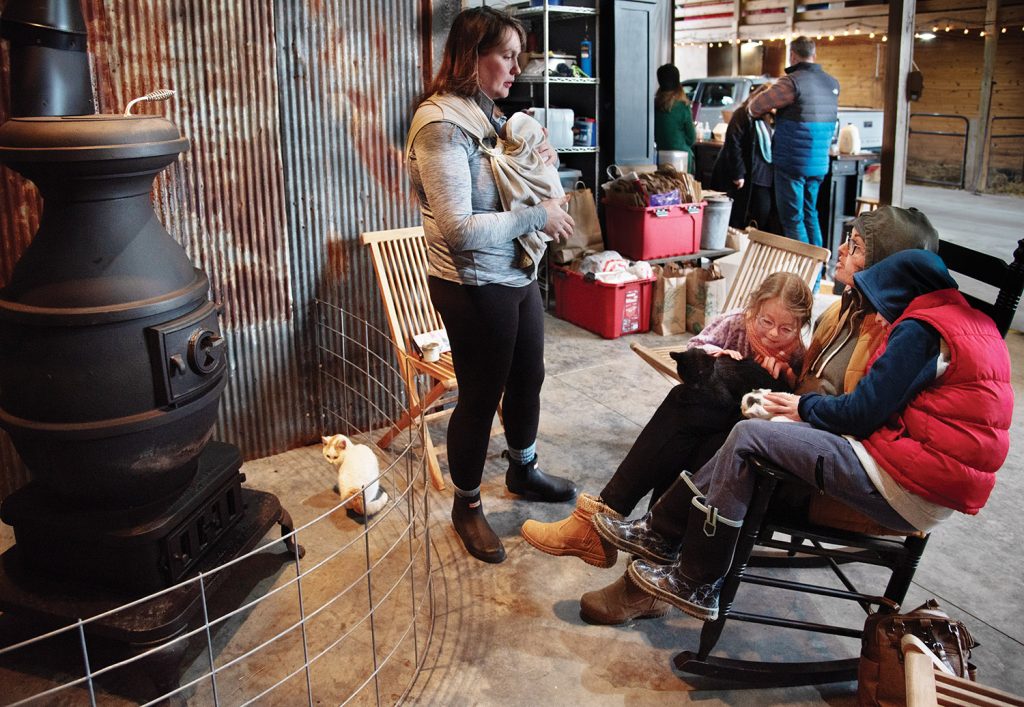
When Smith talks about children being close to land and nature, he speaks from experience. He grew up on a farm in Texas and has four children, ranging in age from 10 to 17. It took a re-examination of his role as a father and the lessons he wanted to leave his children to bring him back to the farming of his upbringing and bring WonderTree Farm to life.
After his 12 years in the NFL ended in Washington in 2012 (he spent 10 with the Colts, two with the Redskins), he and his wife, Jennifer, began looking for a home. He said they looked at his home state of Texas, and they considered Nashville because Smith is also a songwriter and musician. But they came back to Indiana, where he played most of his college and pro careers, and where he met and married Jennifer.
“We looked at a couple of places. But in the end, it came down to people and the culture of the place, and we could not find a better place to raise children,” he said.
Yet, after settling back in suburban Indianapolis, there was an emptiness. Smith, a devout Christian, said he felt as if God was tugging at him and asking, “What have you got for me now?” as he tried to figure out what to do with the second half of his life. For a while, he and his band
traveled the state playing their brand of mostly Christian and country music at festivals and other venues. He felt he could also do the motivational speaking circuit. But Smith wondered what he was modeling for his children.
“I looked around at our life, and something was wrong,” he said. “Something was missing in my kids’ development.” Smith said he noticed a “real weakness” in their work ethic, their coping ability, and their understanding of what hardships are — and that taking them on matters.
Looking back, he realized those values were instilled in him by his parents on the 1,000-acre ranch he grew up on north of Dallas.
“A lot of people raise great children in suburbs and subdivisions. I was raised on a farm, where dealing with life issues was a part of life. Anything redeemable about me was imparted through the medium of agriculture. And so, my best idea was to give my children the same experience.”
He approached Jennifer, who grew up on a cul-de-sac in Carmel, about buying a farm, and, though it was a stretch for her, she agreed. In 2014, they bought a 22-acre parcel of land and named it after an expansive 340-year-old white oak tree that stood out across a pond behind the home they built on the property.
“We named it ’WonderTree’ because standing and looking at it just inspired wonder,” Smith said. “It was so big and so old; 180 years old at the Civil War. You just think about all the things that that tree has been here for, before we were a country. How many deer ran past it as a sapling and didn’t step on it? How many soldiers camped under its branches? How many farmers built their house near it?”
The move from their previous home and lifestyle was a complete 180. “It was two miles away from our farm in distance,” Smith said, “and it was a million miles away culturally.”
Smith then designed and built the winged rectangular barn, based on the one he grew up with in Texas, because all farms need a barn, he reasoned. When the barn was complete, the past came home to roost. He bought 18 laying hens, 40 meat chickens and five cows to raise as family food. While he wanted to live on a farm and have his children experience animals and nature, he said he had no expectation of it becoming a working farm.
A FORMATIVE LESSON
There’s an old saying from football: “When in doubt — punt.”
That strategy has become a metaphor used in all walks of life. To punt is to buy time, regroup, reset one’s game plan and avoid doing something half-cocked, risky or uncertain.
Though Smith made his career as a punter, farm life is often about doing the opposite. “There are some things that must be done, and they have to be done now. And it doesn’t matter if they’re hard or life-threatening,” Smith said. Those are the life lessons he wanted to sow in his children. “There’s no punting in this job. That’s kind of an interesting irony. Surrender is not an option.”
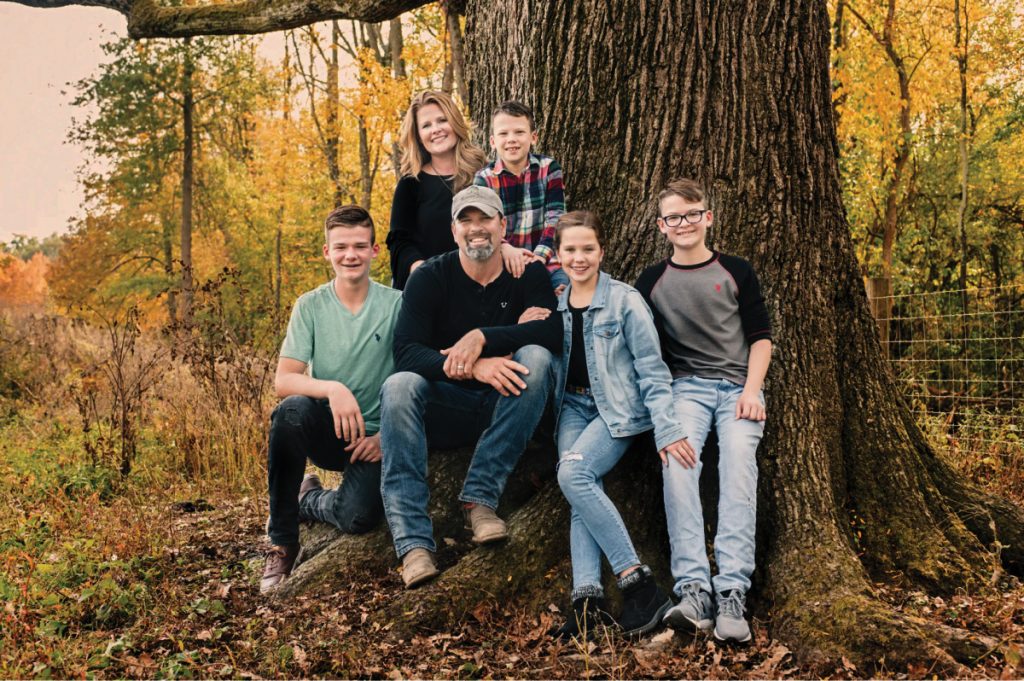
Flashback to Texas, mid-1980s. Smith shared with his audience of co-op leaders one of the defining moments of his life — and it wasn’t winning the Super Bowl with the Colts or playing for legendary coach Lou Holtz at Notre Dame.
He and his dad were checking on the cattle one sweltering day. They saw a nose just inches above the green surface of a swampy watering hole. It was a cow mired in mud after walking out to cool off in the 110-degree heat. Smith said the cow was probably in four feet of water, about 20 feet out. He and his dad were going to have to wade out together, go under the water to tie a rope around her belly, and pull her out with the truck.
From his adolescent point of view, he described mosquitoes the size of robins and the scummy pond
teeming with water moccasins. Sensing Smith’s apprehension, his dad turned to him right before they walked into the water. “He looked at me with his blue eyes and said, ‘Son, we can’t just leave her here.’
“When you’re 9 or 10 years old, that doesn’t sound like a very profound statement. But all these years later, I’ve learned — and it’s something that we need to re-learn as a society, that young people need to know: There are some things that must be done. You can’t log out and log back in tomorrow. And that has shaped my life.”
Out they waded, and down they went. Each took a side. His dad fished the rope under the cow’s belly. In the muck, Smith found his dad’s hand and brought the end of the rope up. Together, they saved the cow.
SOWING SEEDS OF ’WONDER’
Returning to raising cattle and chickens at WonderTree rekindled a passion for farming in Smith. And, like a lot of living things, he said, the farm continued to grow.
“Once we started producing eggs, people started asking if they could buy them, and we started selling. Everything we were making for ourselves, other people were interested in, and we had surplus. So, we just sold it. In the truest sense — not the government branding sense — but in the truest sense, it is an organic venture,” he said. “The farm just organically came together.”
Before COVID-19 came along, WonderTree opened on Saturdays for an experience called “Farm Day,” inviting patrons out for horse rides and hayrides pulled by a red, white and blue painted Farmall tractor. “We just decided to make it a bit of an attraction. My daughter sells cotton candy, we have desserts, it’s kind of a festive environment,” Smith said. “We have horses and cows and goats and donkeys, dogs and cats.
“The main thing that we offer is an unregulated day in the country. We just say, ‘Come during our open hours. As long as you buy something, just be here. Enjoy it.’ You’d be surprised how a kid can be there for three hours and never ask their parents for a phone or a screen. That’s pretty remarkable.”
Farm Day now attracts some 300 to 400 people every Saturday. The farm also hosts field trips, birthday parties and group outings.
As the farm added more animals, the farm store grew. Other sustainable farmers in the area who share in the regenerative vision added dairy products, honey, elderberry syrup and other organically grown goods to the meats and eggs raised at WonderTree. Today, the farm has thousands of regular customers.
“We never intended to put a walk-in freezer over there,” Smith said, pointing out how things have changed in his original barn. “We never intended this kind of store.”
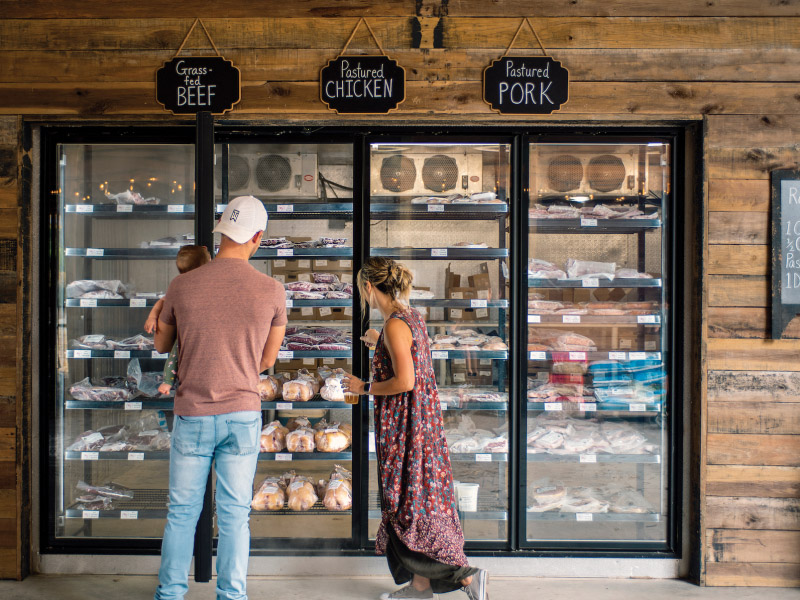
He originally elevated the barn’s floor off the center aisle — where the pot-bellied stove and restrooms now sit — because he thought he’d eventually add an office there. “I put in 16-by-16 doors thinking, ’I’m kind of clumsy; I don’t want to drive a tractor into the doorframes.’ Turns out that they’re easier for people to drive through to buy meat through the winter,” he said. “There are just so many things here that were unintentional that ended up being good ideas.”
One change, however, wasn’t as serendipitous. The farm’s namesake, the WonderTree itself, gave up the ghost. Smith said it was thinning when they bought the land. Finally, it put out no leaves at all. Last summer, the massive, venerable tree was cut down. Smith left its huge stump for a future, yet undecided project. As one would expect of a regenerative farmer, Smith milled the limbs and branches into boards which he’s now using to side a new multi-use barn on the farm. “It’s special for it to live on and remain part of the fiber of the farm,” he said of the mighty tree.
Today, the farm may have as many as 100 cattle, depending on the season, as well as pigs, chickens and other livestock. Along with the original 22 acres, he now leases over 120 more nearby — as his sociology experiment in “how to raise good kids” evolved into a new full-time career he loves.
What’s more, he said Jennifer also loves it, and the kids do, too. “They have all been pretty much raised in it. And in their work ethic and in their general hardiness, they’re beginning to understand why this was a really good idea.”
Though Smith’s father died in 2020, Smith said his dad did get to see the farm at its beginning. “He got to see his influence on me. He was very proud.”
But he said his dad was from a generation that questioned why anyone would farm if they didn’t have to. “They were in a real sweet place in American development when you had plenty of food, you had plenty of farmers. You didn’t need to farm for your community, necessarily. Of course, I say, we’re getting back into a time we’re going to need people to farm.”
Whether his children follow him into farming isn’t important, Smith said. “What matters most to me is that whatever they do in life, they take the lessons we’ve learned here — the work ethic that has been modeled for them and that they’ve taken part in and the character that just comes from the kind of work we do — and apply it to whatever they do. There’s no pressure on my children to be a farmer, only pressure to be tough, and good and hardworking.”
GROWING THE FUTURE
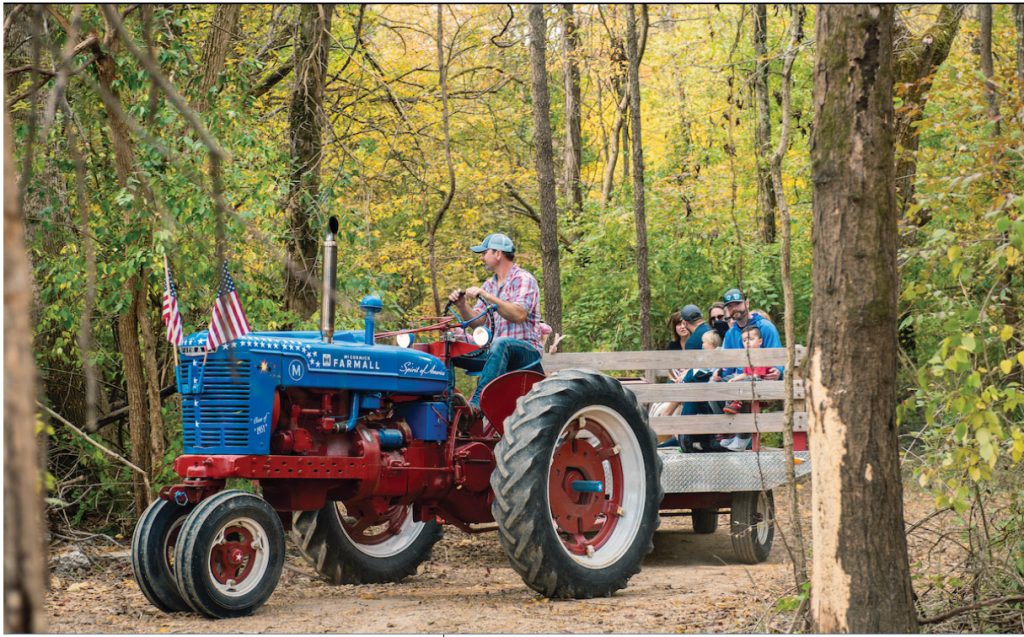
With the morning farm store hours over and those big barn doors closed, Smith sat before the pot-bellied stove for a time out, black kitten on his knee, before heading out to continue work on the new barn, sided with the wood from the WonderTree.
A few hours earlier, Smith was sacking groceries and helping customers carry bags to their SUVs and minivans. Some 40 vehicles passed through the barn that day. The winter drive-thru, an idea Jennifer first proposed, made it easier for their customers and was needed to keep the farm open during winter.
WonderTree Farm is on the scrimmage line between an encroaching Greater Indianapolis suburbia and the flat farmlands to the north. To its south, east and west are new housing developments and golf courses, some that will eye-rollingly use “Farms” in their name. But WonderTree is an honest-to-goodness working farm — with an emphasis on “honest” and “goodness,” and “working,” too.
“I am not an ex-football player playing cowboy in the suburbs,” Smith said. “We have real ground, real stocking rates, real production and 4,000 customers that buy from us who live within 10 miles of my farm. So, it’s very much a real thing.” He has noted that he feels God gave him the ability to play football for a while so he could come back to farming like this.
“And,” Smith added, “we actually believe that this is the future of agriculture. We believe that the best way to have sustainable food systems is for people to raise food and sell to the people around them. Maybe 40 farms like mine and larger in central Indiana, selling to people who live all around them, is a good idea. Then, if I get run over by a beer truck, the guy next door can pick up the slack while my kids are coming in underneath me, or we’re selling the farm or something like that. You won’t have these situations where some giant plant has 12 people get COVID-19 and they have to euthanize 3 million hogs. We think that’s pretty unsustainable … call me crazy.
“A more sustainable food system would be one where you had a myriad of farms like ours that produce for the people around them. And those people who live around them also have gardens, laying hens, and a milk cow … that’s how my grandparents lived. People think that’s crazy, but it’s really not. If you live in a
neighborhood, and you have a 16th of an acre in your backyard, some tiny little plot, you’d be shocked how many vegetables, fruits and eggs you can produce,” he continued. “I just think more responsibility placed on individuals and on local farms is probably how my kids and grandkids end up producing food.”
RICHARD G. BIEVER is senior editor of Indiana Connection
All About WonderTree Farm
2280 S. U.S. 421, Zionsville, IN 46077
Market Hours:
Tuesday: 10 a.m.-1 p.m.
Thursday: 3-6 p.m.
Friday: 10 a.m.-1 p.m.
Farm Day
Saturday: 10 a.m.-1 p.m. (Begins in May/June and runs through the last Saturday in October)
Newsletter
Through WonderTree’s website, sign up for its emailed newsletter that’s filled with information about the farm and its products. The newsletter includes Hunter Smith’s thoughtful, entertaining and insightful essays about the farm and his views on agriculture, faith, family, traditions, nature … you name it.
For more information:
info@wondertreefarm.com
317-732-8930
Scouting report on Hunter Smith
- Born Aug. 9, 1977; Sherman, Texas; age 45
- Married with four children; lives in Zionsville, Indiana
- Attended Sherman High School (1991-1995); lettered in football, basketball and track. In football, he played quarterback, tight end, punter and kicker, and was a two-time Texas All-State selection.
- Attended the University of Notre Dame in South Bend (1995-1999); played in every game over the course of his four seasons as punter and field goal kicker. He ranks second at Notre Dame in career punting yardage with an average of 41.2 yards per punt. He graduated from Notre Dame in 1999 with degrees in theology and sociology.
- Drafted in the seventh round by the Indianapolis Colts (210 overall) in the 1999 NFL Draft; played 10 seasons (1999-2008) with Indianapolis; wore number 17.
- Signed with the Washington Redskins in 2009; played two seasons (2009-2010) in Washington; wore number 3.
Career highlights and stats:
- Super Bowl Champion (XLI) (Feb. 4, 2007) with the Colts
- Named Pro Bowl Alternate three times.
- Punts: 691; punting yards: 24,500; punting average: 43 yards.

